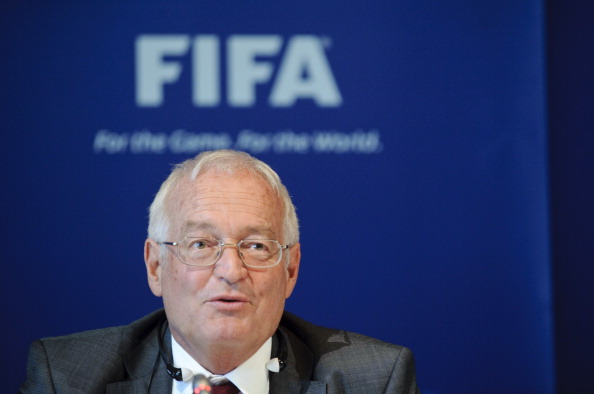By Andrew Warshaw
May 15 – Germany’s jettisoned FIFA ethics judge Hans-Joachim Eckert has spoken of his personal hurt at being targeted in Gianni Infantino’s purge of senior judicial personnel.
Having played a major role in the downfall of Sepp Blatter and other major powerbrokers, Eckert says he was particular upset that FIFA “couldn’t be bothered” to inform him of their decision.
In between being officially removed last week by the FIFA Council and the ruling being rubberstamped 48 hours later at the full FIFA Congress, Eckert held a hurriedly arranged press conference in Bahrain together with fellow ousted ethics chief, lead investigator Cornel Borbely, and having now had a few days to reflect on events, gave a no-holds-barred interview to Germany’s Deutsche Welle saying he was treated with a “lack of respect”.
“I know that I did nothing that I regret in my five years in this position at FIFA,” said Eckert. “It was clear from the beginning that it would be a very difficult job. When I hear at the Congress that we had done too little and been working too slowly, I can only point to the milestones that we achieved and how many cases we dealt with in during this time. Whether this criticism is justified is for others to decide.”
Infantino says there was no time to tell Eckert and Borbely they had been replaced before the decision was actually taken in Council. But Eckert doesn’t buy this.
“The secretary general [Fatma Samoura] publicly stated a few weeks ago that she supported the Ethics Committee and that we should be nominated again. Infantino said nothing to the contrary. He chose his words carefully when he said ‘I cannot make a clear statement in support of you in the run-up to the Congress, but a normal procedure has to be followed’. But there was no indication that he was about to get rid of us.”
Commenting on Infantino’s reasoning for the changes – that he wanted fewer Europeans -Eckert, replaced by Greece’s Vassilios Skouris, poured scorn on such a weak argument.
“What can I say? I find it almost amusing to say ‘we have to become more representative worldwide’ and then replace a German with a Greek. The last I checked, Greece is still part of Europe, but I must have a different view of the map.”
Eckert says no-one should under-estimate the task being undertaken by the new ethics chiefs, not least when it suddenly comes to dealing with major cases in a different language.
“From a very rational point of view, the new people are sure to have the necessary legal qualifications, and have the technical knowhow to deal with the ongoing cases and familiarise themselves with material. This is also not all that easy due to the language involved. Take the case related to the 2006 World Cup which was hosted by Germany, for example. All of the documents and files are in German. We are not just talking about a couple of hundred pages, but thousands.”
“With all of the new people, it will take months, and I am quite conservative, until the chamber will be able to work efficiently. Don’t forget that all but two people have been replaced.”
So what prompted Infantino’s pre-emptive strike?
“One can only speculate on the reason why. But I think part of the reason must have been that the Ethics Committee lived out its independence. I don’t mean this in a negative sense. We were independent and so we took the attitude that we were not going to be afraid of big names, we were simply going to do our job.”
Eckert also bemoaned FIFA’s decision to get rid of the chairman of the Governance committee, Miguel Maduro, saying the Portuguese had been “highly acclaimed” all over Europe and taking the same view as many observers as to why Muduro was shown the door after less than a year in charge of vetting applicants for senior positions.
“It is hard not to think that there was some connection between this and his ruling that Vitaly Mutko [former Russian sports minister, head of the organising committee for the 2018 World Cup] was not eligible to be elected to the FIFA Council.”
Germany’s DFB boss Reinhard Grindel was the only FIFA Council member to break ranks publicly and say he had backed Eckert and Borbely being retained, declaring to the media in Bahrain that Infantino had simply taken the decision unilaterally, then presented it for approval.
Providing additional insight, Eckert said: “The problem was that the voting was conducted in blocs as opposed to by individuals. The FIFA president presented a list of candidates that didn’t include us. Should the DFB president have said: I want to reject the entire list? The fact that he abstained from the vote and didn’t simply wave it through deserves respect.”
“And just to be clear, it is not about me personally. I didn’t have any right of extension or anything. What bothers me the most – and this hurts me personally, is the lack of respect that the FIFA officials have shown us, that they couldn’t be bothered to inform us about the decision or have a conversation.”
Contact the writer of this story at moc.l1740258816labto1740258816ofdlr1740258816owedi1740258816sni@w1740258816ahsra1740258816w.wer1740258816dna1740258816

